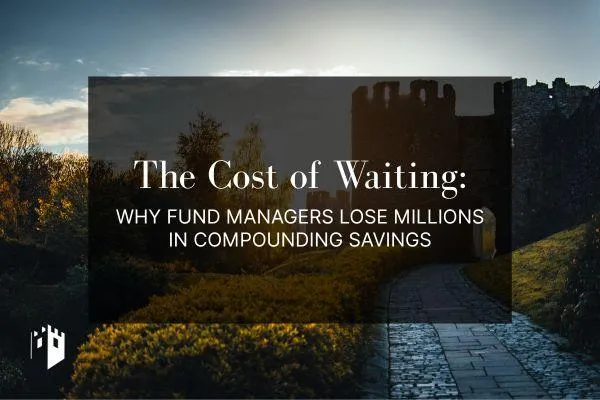Elite CPA Services for the Real Estate Industry

Looking for a CFO with institutional experience and entrepreneurial execution?
Then you’re in the right place.
Here at Stonehan, we bring a unique combination of entrepreneurial and Big 4 institutional experience. We take pride in our ruthless attention to detail, professional skepticism, and relentless pursuit of opportunities that meet only the highest standards for financial performance.
We serve the real estate industry, family offices, private equity fund managers, and accredited investors.
From the Vault

The Cost of Waiting: Why Fund Managers Lose Millions in Compounding Savings
Fund managers obsess over fees, IRR, and investor distributions. But too many delay tax planning until it’s too late. They treat taxes as a compliance event in April, not a strategic lever in November.
That delay costs millions. Every year you wait, you don’t just overpay the IRS, you lose the ability to reinvest those savings and compound them into larger distributions and stronger fund performance.
At Stonehan, we see this pattern constantly. The most successful GPs aren’t just better operators, they’re better planners. They use tax strategy as a compounding growth engine, not a year-end afterthought.
The Real Cost of Delay
When you wait until April, you’ve already missed opportunities that can’t be recovered:
Elections. Grouping elections, depreciation allocations, and accounting method changes can’t be retroactively applied. If you didn’t file correctly, you’re locked out.
Structuring opportunities. Management companies left as Schedule C entities pay unnecessary self-employment tax year after year.
Material participation. Real Estate Professional Status and short-term rental classifications require contemporaneous time tracking. You can’t recreate hours after the year closes.
State tax reserves. If you distribute before reserving for state liabilities, you’ll face clawbacks or six-figure GP hits later.
Each of these missteps quietly chips away at returns, investor trust, and long-term wealth. and the longer you wait, the more it compounds.
Why Compounding Matters
Tax savings aren’t just about keeping more, they’re about growing more.
Saving $250 K in taxes this year doesn’t just mean $250 K more in your pocket. Reinvested at a 12 % IRR:
Year 1: $250,000
Year 5: $440,000
Year 10: $775,000
That’s a $525,000 difference created by timing alone. Waiting means that money never compounds. The IRS doesn’t refund opportunity.
Tax savings are capital. and capital compounds. Every dollar kept is a dollar that can be reinvested into the next acquisition, fund, or promote structure.
Proactive vs. Reactive: A Tale of Two Funds
Let’s look at how two funds play out over time.
Fund A: The Proactive Strategist
Engages Stonehan by Q3.
Aligns depreciation allocations under Section 704(b) so GPs capture real, usable deductions.
Implements PTET elections to bypass the federal SALT cap.
Reserves for state liabilities at disposition.
Qualifies for Real Estate Professional Status (REPS), unlocking full loss utilization.
Result: The GP saves hundreds of thousands in year-one taxes, LPs see higher after-tax distributions, and the fund raises capital faster because of its clean, strategic execution.
Fund B: The Reactive Filer
Waits until April.
Misses elections.
Files returns without adjusting allocations or structure.
Gets hit with unexpected state tax bills and delayed K-1s.
Result: LPs lose depreciation benefits, the GP absorbs costs, and investors question the sponsor’s operational discipline.
Over one deal, the difference might be six figures. Over a decade, it’s millions, and those millions compound into stronger AUM, faster fund launches, and higher confidence with institutional LPs.
The Investor Relations Impact
Your investors notice more than you think.
LPs expect sponsors to be sophisticated. When you fail to capture available deductions, they indirectly pay the price through smaller after-tax returns.
When LPs realize their GP didn’t claim obvious depreciation or failed to structure their management company properly, credibility erodes. And in an environment where capital allocators have options, credibility compounds just like returns.
Strong tax planning isn’t just about compliance, it’s a demonstration of stewardship. It shows investors that you’re not just chasing yield, but protecting every dollar of it.
Why Most CPAs Fall Behind
The issue isn’t that fund managers don’t care about tax strategy, it’s that they’re relying on CPAs who see tax season as a finish line, not a battlefield.
Most accountants:
File federal returns and move on.
Never review operating agreements for allocation opportunities.
Miss grouping elections and REPS eligibility.
Don’t coordinate with attorneys or administrators.
By the time they’re involved, the planning window is closed.
At Stonehan, we do things differently. We design Tax Battle Plans, comprehensive, forward-looking strategies built months before filing season.
The Battle Plan Difference
Our Tax Battle Plan approach helps fund managers turn tax strategy into a compounding advantage.
Here’s what it includes:
Entity chart reviews to identify inefficient structures and reallocate income.
Quarterly check-ins so no elections or timing opportunities slip through the cracks.
Audit-ready documentation to substantiate allocations, promote structures, and cost segregation studies.
Multi-state analysis to ensure compliance in every jurisdiction where you operate.
Real Estate Professional Status verification to maximize active loss utilization.
These aren’t tasks you can bolt on in April. They have to be implemented before December 31.
Our process is built around proactive coordination between attorneys, fund administrators, and management teams, the same integrated approach described in Stonehan’s Exemplary Real Estate Tax Services framework. It’s not just about filing returns, it’s about structuring wealth.
The Cost of Waiting, Quantified
Waiting a year doesn’t just mean missing one deduction, it means losing a decade of growth.
Let’s take two identical GPs:
GP 1 implements a strategy now. Saves $300K in taxes annually and reinvests it at 12% IRR.
GP 2 waits a year to plan.
After 10 years:
GP 1 has $4.6 million more in compounded after-tax capital than GP 2.
The takeaway: Tax planning doesn’t just save you money, it accelerates your growth curve.
Every month you delay planning is a month your capital stops compounding.
Frequently Asked Questions
Q: Can tax strategy really change my fund’s IRR?
A: Absolutely. Lowering your tax drag directly improves after-tax IRR. When depreciation allocations, REPS qualification, and entity elections are handled proactively, you’re not just saving, you’re performing.
Q: What if I already missed this year’s elections?
A: You can’t backdate elections, but you can prepare for next year. The key is starting before December 31, so your strategy is baked into your next tax cycle.
Q: How early should fund managers begin planning?
A: Ideally in Q3. By Q4, opportunities begin closing rapidly. Waiting until tax season is too late to make structural changes or capture bonus depreciation.
Q: What does a “Tax Battle Plan” actually include?
A: A full diagnostic of your entities, allocations, and state nexus exposures, plus an actionable roadmap that connects tax savings to fund growth objectives.
Final Takeaway: Tax Strategy Is Growth Strategy
Every year you wait to plan, you don’t just overpay the IRS, you underperform your own potential.
Taxes aren’t a static cost; they’re a controllable lever. The difference between a compliance mindset and a compounding mindset is millions in retained wealth over time.
The most successful fund managers don’t just manage money, they manage outcomes.
Act Before Year-End
With just weeks left in the year, now is the time to implement the strategies that can redefine your 2025 results. Once December 31 passes, most opportunities are gone.
📆 Book your Tax Strategy Call with James before year-end to:
Build your 2025 Tax Battle Plan
Reassess your fund’s entity structures and allocations
Confirm eligibility for Real Estate Professional Status
Lock in PTET elections and state tax savings before it’s too late
At Stonehan, we help fund managers design tax systems that compound over time, because long-term success isn’t built in April; it’s built now.
📲 Schedule Your Tax Strategy Session Now →
Don’t just plan for taxes. Engineer your advantage.
Featured Podcast Appearance
James Bohan on the RIZZ Podcast:
How financial strategy can supercharge marketing and business development in commercial real estate.
In his appearance on the RIZZ Podcast, James Bohan, founder of Stonehan, reveals powerful insights on using financial strategies to elevate your real estate marketing and growth. Discover James' unique journey from family dinners discussing property deals to innovative solutions for affordable housing and boutique hospitality investments.
Watch this if you're serious about keeping more of what you earn, and building a portfolio that lasts

Seven Critical Factors Most CPAs Overlook
There’s a difference between working with a CPA and working with an entrepreneurial CFO focused on serving fellow entrepreneurs. At Stonehan we guide our clients by going beyond surface level investigation, into the nuances that only sophisticated investors can appreciate.

Services we offer
Accountancy
Outsourced CFO Support for Real Estate
Strategic Tax Advisory
Consolidated Financial Reporting
White Glove Tax and Accounting
Ongoing Compliance
Back Office Support
Real Estate Private Equity
Our private equity funds are focused on strategically selected assets in geographic locations that prove themselves despite our ruthless skepticism. We provide comprehensive financial oversight and institutional quality reporting for every asset in our portfolio.
Qualifications
Certified Public Accountant (CPA)
Master's in Real Estate Development
CFO with $1B of transactional experience
4th Generation Real Estate Developer
Big 4 Experience
Series 7 (inactive)
What My Clients Are Saying...


“James has been instrumental in driving our investment structures and initiatives to be the most tax-efficient possible. His experience as a private equity CFO has proved invaluable to us on our routine calls.”
Tyler Lyons, Chief Investment Officer


“Stonehan has worked closely with me over the years to deliver timely custom KPI reports and financial statements that help me get a whole picture of my real estate portfolio and tax position. Over the years James has become a trusted advisor to my family and takes care of our comprehensive tax strategy.”
Ivan Matthew, Real Estate Developer


“After frustrating delays and a lack of professionalism from our prior tax preparer, working with Stonehan Accountancy has given us a great peace of mind to know that our investors are getting their K1s timely done by someone who cares, follows proper tax law, and has Big4 level experience.”
Hunter Thompson, Founder, ASYM Capital

Why Stonehan
As a CFO with both institutional and entrepreneurial experience, Stonehan has the unique ability to offer strategic, personalized, and forward-thinking financial solutions that resonate with real estate family offices and high-net-worth individuals.

4th generation real estate developer

Institutional quality reporting, boutique quality attention
⚡ Site Built with BAMF Technology ⚡






